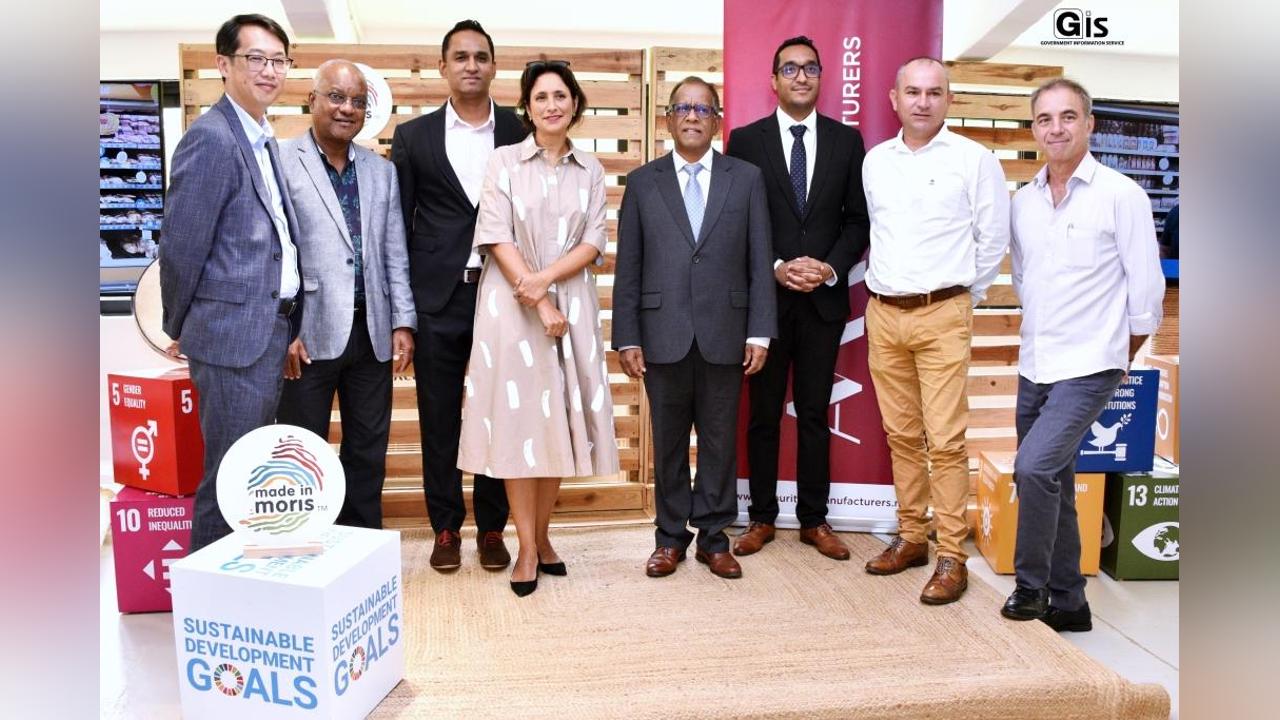Africa-Press – Mauritius. The Association of Mauritian Manufacturers (AMM) held, this morning, its 28th Annual General Meeting (AGM) at its Headquarters in Saint Pierre. The Minister of Industrial Development, SMEs and Cooperatives, Mr Soomilduth Bholah; the Chief Executive Officer (CEO) of the AMM and Managing Director of Made in Moris, Ms Shirin Gunny; the President of the AMM, Mr Yannick Applasamy; and other personalities were present on the occasion.
A strategic foresight workshop, led by the Senior Economist of the United Nations Office in Mauritius and Seychelles, Mr Sebastien Vauzelle, was also held on that occasion.
Representatives from several associations across the country, including the Economic Development Board, Business Mauritius, the Chamber of Agriculture, and the Tourism Authority attended the workshop.
The objective of the workshop was to engage members of the AMM and Made in Moris in a reflection on the main challenges, opportunities and risks ahead for the Mauritian Manufacturing Sector.
In his keynote address, Minister Bholah acknowledged the tremendous work done by AMM since its inception and how it helped in promoting the interests of the local manufacturing sector.
“You have been able to defend, preserve, develop and sometimes completely reinvent this Mauritian know-how against all odds, especially during one of the most difficult periods we have ever experienced, the COVID-19 pandemic,” he said.
Speaking on the ‘Made in Moris’ label, he recalled that it was initially launched in 11 companies and two sectors adding that today it unites nearly 150 companies and represents more than 350 brands and 3,800 products.
“The label is presently recognised in seven economic sectors, namely industrial production, textiles, agri-food, agriculture, cultural, creative and digital, hotel services, and service industry,” Mr Bholah stressed.
Furthermore, the Minister highlighted that although purchasing locally has become part of society, there are several challenges ahead, including the manpower to ensure that factories maintain their supply chains to meet demand.
On this note, he emphasised that the local industry is called upon to play a leading role in strategic issues such as the circular economy, food security, and the energy transition.
Local expertise and know-how, Mr Bholah underscored, are cultural assets that need to be protected as for an entrepreneur, it is essential to renew oneself by innovating and adapting to the times.
“It is equally imperative to find customers who are ready to embark on the adventure and choose quality and local commitment,” he stated.
On this score, he reiterated the importance of ensuring the sustainability of our local industry by seizing new opportunities, adopting green practices, integrating new technologies such as Artificial Intelligence and mechanisation and conquering new markets.
Minister Bholah further appealed for the commitment of each and everyone in this collective approach so as to revitalise the economy as, according to him, ‘Made in Moris’ is the strength of the collective.
On this note, he urged the population to consume and buy locally as it is the most impactful and committed act that can be done to support our local industry.
“To consume a local product is to value our agriculture, our fishing, our crafts, our fauna and flora, and our industry,” he pointed out.
For her part, the CEO of the AMM and Managing Director of the Made in Moris label, Ms Shirin Gunny, outlined three initiatives that can strengthen the interdependence of the industry sectors, namely, a dedicated ‘Made in Moris space’ at the Sir Seewoosagur Ramgoolam International Airport, the ‘Made in Moris’ Pledge, and the creation of a local Purchasing Observatory.
“We are all at the service of one local industry and every door we open for ‘Made in Moris’ is also opened for all other local businesses,” she indicated.
As for the President of the AMM, Mr Applasamy, he indicated that in 2022, the Mauritian manufacturing sector contributed a value-added of Rs 68 billion, higher than the pre-pandemic Rs 53 billion, which shows that the manufacturing sector is back to its pre-pandemic level in less than two years and has far exceeded the 2019 figures.
On this note, he reiterated that there is an urgent need to re-evaluate priorities and create conditions to consolidate local production through investment, industrial innovation, and enhanced cooperation between industries in the Indian Ocean and East African region.
He also stressed the importance of revalorising employment in the local industry as the industrial profession today is about innovation and agility. “It is clear that these are not subjects that we can treat in isolation therefore we need to define a national strategy and response in order to maintain our activities,” the President of the AMM said.
The Association of Mauritian Manufacturers The AMM was created in 1995 with the aim to work to restore the economic relevance of local production for the domestic and export markets and to accompany the transformation of the Mauritian manufacturing sector.
In June 2013, AMM launched the ‘Made in Moris’ label as a differentiation tool in a bid to add value to Mauritian brands by emphasising know-how. At present, the ‘Made in Moris’ label advocates responsible local purchasing.
For More News And Analysis About Mauritius Follow Africa-Press







